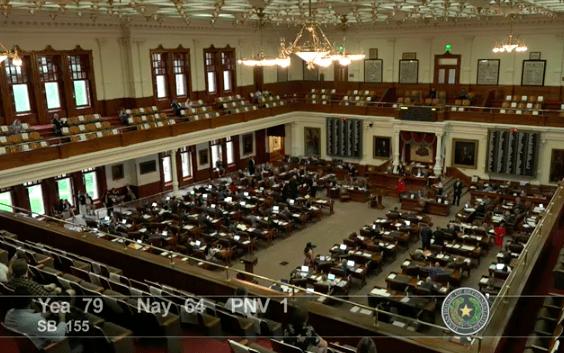UPDATED May 18 to add final passage of SB 155.
A voter roll maintenance bill identified as a top election integrity priority by grassroots Republicans has moved a step closer to finally passing the Texas Legislature.
On Monday, Senate Bill 155 by State Sen. Charles Perry (R–Lubbock) advanced to third reading (the final stage before passage) in the Texas House after the Senate approved the bill more than a month ago.
“All we’re doing is adding to the notification list. We’re not changing the protocol,” State Rep. Stephanie Klick (R–Fort Worth) said Monday in response to Democrat opposition to the measure.
SB 155 adds the Texas attorney general to the list of officials receiving information about voters who identify themselves as not meeting citizenship or residency qualifications for jury service. This means they are also ineligible to be registered to vote in the county in which they were called to serve on a jury—or, in the case of noncitizens, at all.
It’s a violation of both state and federal law for noncitizens to vote or register to vote.
In 2018, prosecutors with the AG’s office confirmed to lawmakers that noncitizens are registering to vote and voting in Texas elections, and testified that procedures for removing ineligible noncitizens from voter rolls aren’t being followed correctly “or even at all” by some county election officials.
After lawmakers failed to pass their priority election reforms in 2019, the Republican Party of Texas made election integrity its top legislative priority for 2021.
The RPT identified SB 155 and its companion, House Bill 2339 by Klick and 16 co-authors, as meeting its election integrity policy goals of maintaining clean voter rolls and verifying voters’ citizenship.
Under current state law, county court clerks maintain lists of people who are excused or disqualified from jury service because they respond to a jury summons that they are not a U.S. citizen or not a resident of the county.
The lists are sent monthly to the voter registrar of the county and the Texas secretary of state for comparison to voter rolls, as well as to the county or district attorney for an investigation of whether any person committed an offense under Section 13.007 of the Texas Election Code or other law.
The only change SB 155 makes is to send the lists to the AG for review as well, allowing the office to handle investigations in counties where the DA is unwilling or unable to comply with the directive.
The bill makes no changes to the current notification process for voters who told the county they aren’t eligible to vote.
SB 155 passed the Senate on April 6. More than a month later, on May 13, the House brought it up for consideration in lieu of HB 2339.
Debate on the bill was postponed until Monday, when it passed to third reading by a vote of 79-64.
An amendment by Democrat State Rep. Victoria Neave (Dallas) excludes from the reporting requirement voters who are eligible but exempt from jury service—including high school students, college students, and active-duty military deployed outside their home county—even though those voters are not currently part of the reports.
Four other Democrat amendments were rejected.
On Tuesday, SB 155 finally passed the House without further debate, by a vote of 83-61.
Because the House and Senate versions of SB 155 are no longer identical, the bill must go back to the Senate for a final vote of approval concurring with the House changes.
Republican Gov. Greg Abbott gave election integrity fast-track emergency status back in February, and he said in March he was ready to sign “robust” legislation. But with just two weeks left to make it happen, lawmakers had still not sent him a single priority election reform.
The Republican-controlled Legislature is running out of time to get priority election reform bills to the governor’s desk before the session ends on May 31.
The last day for the House to vote Senate bills out of committee is May 22; the last day for the House to consider Senate bills on second reading is May 25. House and Senate conference committee reports must be distributed by May 29 and adopted by May 30.
Texas Scorecard is tracking the progress of key election integrity bills in the House and Senate through the end of the legislative session.





